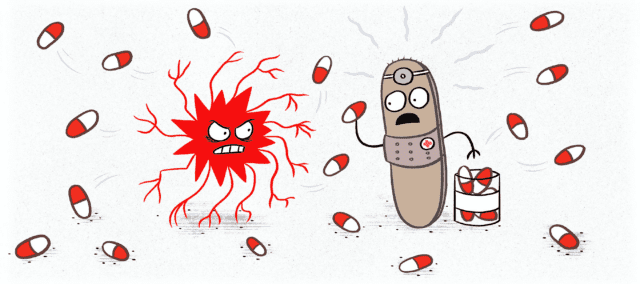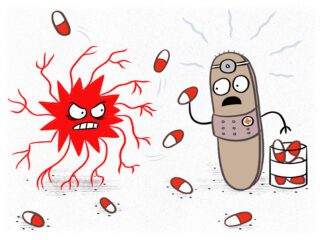

Part Three: Myths and Facts
There is a lot of old school thinking about pain floating around that we now know (yay research!) just isn’t true. It turns out that what kids, parents, and providers think they know about pain can be a big barrier to making things better. So let’s clear some things up with good, solid facts!
Myth
Kids’ pain experiences don’t matter…they forget them anyway.

Fact
- Wrong! Our early pain experiences have long term impact. They change the way we experience pain and how we feel about healthcare into adulthood.

Myth
- Pain is the same for everyone.

Fact
- Pain is DIFFERENT for everyone. It’s even different for the same person, depending. It depends on MANY things, including past pain experiences, genetics, stress, mood, culture, etc.

Myth
- There is nothing we can do to prevent the freakout around needles for kids or adults.

Fact
- Nope. There are simple, effective, research proven strategies that make needle pokes and other procedures a lot easier and more comfortable.

Myth
- People who are scared of needles just need to suck it up…it’s no big deal.

Fact
- It is a really big deal: it’s a fear that likely developed in childhood, is VERY common, and can have a major impact. People need skills and support…not shame.

Myth
- All doctors and medical providers know everything there is to know about all pain management techniques.

Fact
- It turns out not, even the best ones! Chances are they only received 7-10 hours of instruction on pain in med school. You might need to give them some information (we can help!).

Myth
If something hurts more than a doctor “thinks” it should, then it means you are crazy.

Fact
- Wrong. Everyone’s body is different, and what might be not a big deal to one person can be incredibly painful to someone else. It’s not crazy…it’s how people work.

Myth
- Everyone gets the same kind of treatment for their pain.

Fact
The truth: Black people and those from other communities of color are much more likely to be undertreated, even kids. Women are also more likely to not get the care they need.

Myth
Doing best practice pain management slows down the work of medical providers, so it’s really hard to fit into their workflows.

Fact
Another persistent but untrue myth! Turns out good pain management practice improves workflow, reduces wait times, and improves both patient and provider satisfaction.

Myth
If psychological techniques like mindfulness and stress management work for my pain, it means my pain isn’t real.

Fact
Nooooooo! It means you’re doing a great job taking care of yourself and that you understand pain is a biological, psychological and social experience. By changing our psychological state, we change our very real pain experience.

Myth
Black people experience less pain.

Fact
This is a racist idea left over from days of slavery. It’s been debunked over and over, but this myth still persists and creates a lot of unnecessary suffering even today.

Myth
If I say anything about what works for me or my child for pain management, they will be mad and insulted and might not want to care for me.

Fact
You and your medical team have the same goal… to create a good healthcare experience for you & your kiddo. Collaboration makes that happen. You combine their medical expertise and your expertise in you and your child.

Myth
It’s O.K. to hold my kid now for needle pokes.

Fact
Nope, nope, and Nope. Research is clear that holding down kids (particularly on their backs) is a recipe for medical trauma. There are great comfort positioning techniques that allow for kids to both safe and comforted.

Myth
Needle anxiety is rare. I’m the only one who has it.

Fact
Unless you’re a hermit who lives in the woods, this is impossible. 25% of adults, 50% of teens, and 63% of kids are freaked out by needles… we just don’t talk about it enough (yet!).

Myth
Pain = how much damage there is to your body.

Fact
Nope…MANY things, including your thoughts, feelings, stress level, and what’s going on in the world around you matter too.

Myth
Kids don’t have chronic pain.

Fact
That would be REALLY nice, but the reality is that about 25-30% of kids experience chronic pain.

Myth
I can’t function or do anything until my pain is gone.

Fact
Unfun reality: Finding ways to get back to normal life and activities needs to happen BEFORE the pain goes away. It’s about learning new coping strategies, new habits and changing the way you think about pain.

Myth
Kids should NEVER be given strong pain meds like opioids.

Fact
Nooo! While we obviously need to be cautious and careful, there are definitely injuries and surgeries where they are a really good idea and prevent unnecessary suffering and medical trauma.

Myth
There is a “magic pill” solution to chronic pain.

Fact
While patients AND providers would LOVE this to be true, it’s just not. Treatment is complicated. It involved learning new coping skills and changing the way we think about pain.

Myth
I am always going to feel as bad as I do right now.

Fact
Your brain and body are always changing, so pain can change too. With the right kind of intervention, there is a great research evidence that you can feel a whole lot better.

Myth
My crazy sleep schedule doesn’t have anything to do with my pain.

Fact
A solid sleep schedule and good sleep habits are some of the Best things you can do to improve your pain!

Myth
It’s the parent’s fault that the kids have chronic pain.

Fact
It’s no one’s fault, but it does require a whole new set of parenting skills. Learning how to respond to a child’ pain can be a powerful part of the solution.

Want this in a cool poster form? Check it out here!

Next up: We’d love to show you all the science and research that fuels your superpowers and is the foundation of what we do.